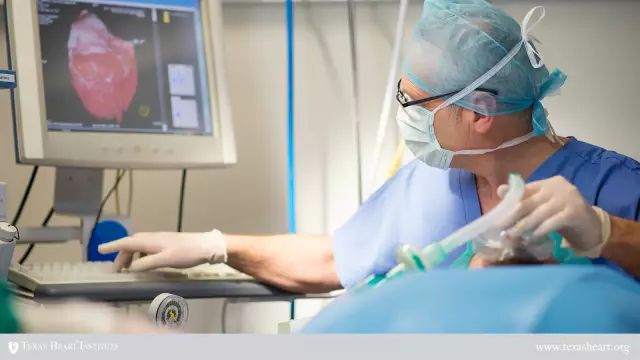- Author Rachel Wainwright wainwright@abchealthonline.com.
- Public 2023-12-15 07:39.
- Last modified 2025-11-02 20:14.
Anesthetist
An anesthesiologist is a medical specialist who is involved in providing anesthesia (pain relief, loss of pain sensitivity) during various surgical procedures, as well as pain, post-traumatic and shock conditions.

The anesthesiologist administers pain medication to the patient and ensures that the patient's body is maintained during the operation.
History of the profession
Anesthesia is a medical specialization that relieves sensitivity and pain relief of a specific organ or part of the body. The first medical anesthetists appeared in the Middle Ages. They deprived patients of sensitivity by hitting the head with some heavy object. During the loss of consciousness, the first medieval doctors performed their operations.
The terms “anesthesia” and “anesthesiologist” were first introduced by the Greek philosopher Dioscorides in the 1st century BC. At the same time, the first drug-like substances began to be used for pain relief and anesthesia, which introduced the patient to a state of sleep.
Later, in the 16-17 centuries, European scientists began to develop a unified concept of anesthesiology, and in the 20th century, the theory of anesthesia and the scientific basis of the specialty anesthesiologist appeared in the United States.
In the 19th century, American doctors performed operations using ether as an anesthetic. Soon, anesthesiology began to represent not only pain relief during surgery, but also the provision of a stable patient's condition, the choice of anesthesia and life support.
The main focus of anesthesiology is the study of acute pain and pathological conditions. The anesthesiologist is closely related to resuscitation, as he supports the patient's body during the operation.
In the 20th century, anesthesiology has become a complex science, the tasks of which are anesthesia, muscle relaxation and premedication.
The specifics of the medical activity of an anesthesiologist
An anesthesiologist is a doctor who ensures the safety of patients during the operative and postoperative period. Interaction with the patient begins before the operation, the doctor examines the patient's medical history and diagnostic indications, identifies the level of complexity of the operation and conducts a conversation with the patient or with his parents / relatives.
Before the operation, on the anesthesiologist's table, the patient's allergy to various pain medications is determined, the patient's mental and physical condition is assessed. If the patient is in a mentally unstable state, the anesthesiologist administers sedative drugs.
Before the start of the operation, the anesthesiologist administers anesthesia and connects the patient to an artificial respiration apparatus, and during the operation monitors the patient's condition and his readings (pulse, blood pressure, body temperature, etc.). After the operation, the doctor monitors the patient's condition for several days.
On the operating table, the anesthesiologist must create optimal conditions for performing surgical procedures. The anesthesiologist assistant is the anesthetist nurse / brother.
Professional qualities and duties of an anesthesiologist
The anesthesiologist must have a high level of knowledge in fundamental medicine. Before the operation, this doctor must fully examine the patient and choose the type of pain reliever. Under general anesthesia, the patient is connected to life-support devices and a special tube is inserted into the trachea.
If during the operation the patient is in a critical condition, then the anesthesiologist must take special measures to stabilize his condition - chest compressions, stopping bleeding, additional anesthesia, etc.
After the operation, this doctor gradually removes the patient from anesthesia, establishes contact with him and monitors his condition.
The duties of an anesthesiologist are strict adherence to medical ethics, attentiveness, competence and constant support of the patient during the operating period.
Found a mistake in the text? Select it and press Ctrl + Enter.






